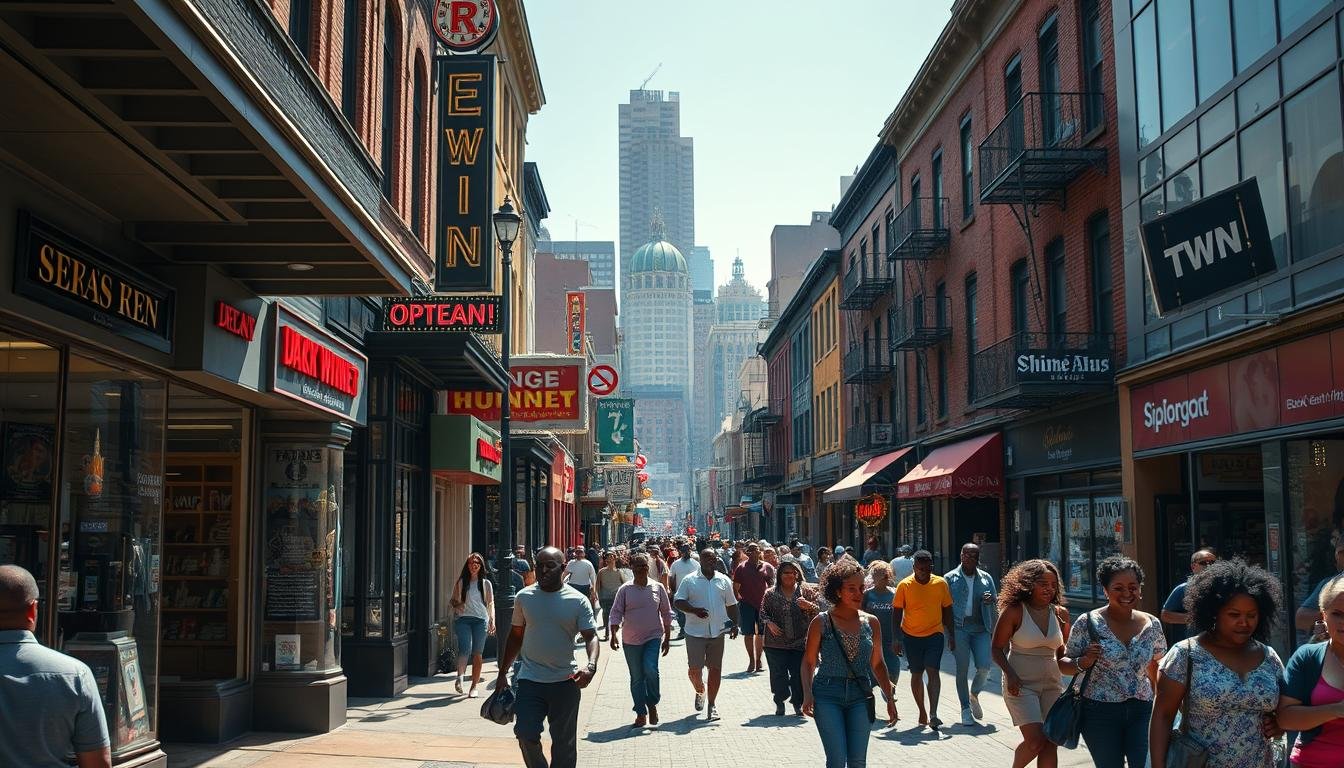Newark’s High Street corridor is a vibrant center of Black entrepreneurship, cultural heritage, and community pride—a living legacy of New Jersey’s historic Black business districts. This guide maps out key landmarks, dining destinations, and cultural institutions that define the area today, offering readers a clear path to explore and support local businesses.
The narrative bridges past and present, spotlighting resources like the Newark Black Owned Business Guide, beloved establishments such as Vonda’s Kitchen, and cultural anchors including the Source of Knowledge Bookstore and the Institute of Jazz Studies at Rutgers-Newark.
Much like Sweet Auburn Avenue in Atlanta and Bronzeville in Chicago, Newark’s High Street shapes the local business scene while strengthening community ties across generations.
This guide previews what to see, where to eat, and how to plan a visit—while tracing the corridor’s evolution from historic Black Wall Street to a modern hub of resilience and reinvention. For more historic districts across the country, explore
Black Wall Streets Across America: City Guides to Historic and Modern Hubs of Black Economic Power.
Key Takeaways
- The article offers a clear list of notable sites, restaurants, and cultural stops.
- It connects historic institutions with newer ventures to show the area’s evolution.
- Readers gain practical guidance for visits and local exploration.
- The corridor illustrates diversity in entrepreneurship, hospitality, arts, and education.
- Authoritative resources and verified facts guide residents and visitors alike.
🏙️ The Legacy of Black Wall Street: How Segregation Shaped Newark’s High Street and Other Black Business Districts
Across the United States, segregation-era policies and systemic exclusion gave rise to distinct African American commercial districts—vital lifelines where Black entrepreneurs built self-sustaining ecosystems of commerce, culture, and civic life.
These corridors emerged because access to white-owned institutions was restricted. In response, Black communities established their own networks of banking, retail, lodging, entertainment, and professional services. These businesses not only met daily needs but also reinforced cultural identity and economic resilience.
Notable examples include:
- Greenwood Avenue in Tulsa, famously known as Black Wall Street
- Parrish Street in Durham, part of the Hayti District
- Sweet Auburn Avenue in Atlanta — A Legacy of Black Prosperity
- Deep Deuce in Oklahoma City and Black Broadway in Washington, D.C.
These districts were more than commercial zones—they were centers of resistance, civic organizing, and cultural pride.
🛣️ Postwar Disruption and the Fight for Preservation
After World War II, many Black business districts faced devastating change. Urban renewal, highway construction, and gentrification displaced long-standing shops and fractured community networks. Desegregation, while a civil rights victory, also shifted patronage patterns—challenging the survival of local Black-owned businesses.
This pattern played out in places like:
Understanding this history is essential to framing today’s efforts in preservation, community ownership, and equitable reinvestment. These strategies aim to align economic growth with civil rights values, ensuring that modern Black business corridors honor the legacy of those who built them.
Here’s the SEO-optimized rewrite of that section, with relevant internal links and strategic use of “Black Wall Street” to reinforce cluster alignment and search visibility:
🏛️ Newark’s High Street: A Black Wall Street Corridor of Historic Black-Owned Enterprises
Newark’s High Street corridor reflects the enduring legacy of Black Wall Street—where historic institutions and modern entrepreneurial hubs connect past and present. A growing network of makers, archivists, and business leaders continues to build on the foundation laid by early Black-owned enterprises.
🏠 Krueger-Scott Mansion and Makerhoods Newark: From Beauty Empire to Entrepreneur Hub
The Krueger-Scott Mansion, once home to Louise Scott’s beauty empire, stands as a symbol of Newark’s Black business legacy. In the 1950s, the mansion supported salons, a charm school, and retail shops that served the surrounding community—mirroring the entrepreneurial spirit found in Boley, Oklahoma and Jackson Ward in Richmond.
Today, the site is approved for redevelopment through Makerhoods Newark, a mixed-use project offering affordable live-work spaces for local entrepreneurs. The Makerhoods Market connects Black makers and small business owners to customers, helping build community wealth through micro-enterprise and creative commerce.
This fusion of legacy and innovation positions High Street as a modern-day Black Wall Street corridor, where economic empowerment and cultural preservation go hand in hand.
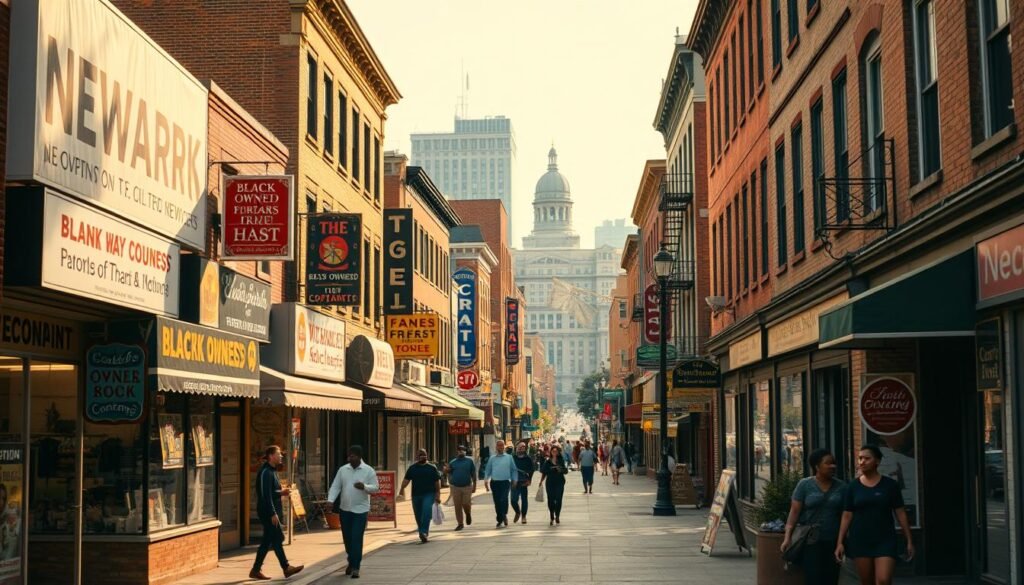
🎷 Cultural Archives and Civic Memory: Preserving Newark’s Black Heritage
Newark’s High Street corridor is not only a center of Black enterprise—it’s also a hub for African American cultural preservation. Institutions like the Institute of Jazz Studies at Rutgers-Newark and the Rise Up North Interactive Archive document Newark’s role in shaping Black music, civil rights, and grassroots leadership.
🎶 Institute of Jazz Studies at Rutgers-Newark: A Legacy of African American Music Culture
The Institute of Jazz Studies houses one of the world’s most comprehensive archives of jazz history, supporting scholars, musicians, and media creators. Its collections trace jazz as a vital thread in American music culture, offering access to rare recordings, manuscripts, and oral histories. The institute also hosts exhibits, events, and research programs that celebrate Newark’s contributions to Black musical innovation—echoing the cultural powerhouses found in Beale Street, Memphis.
✊🏾 Rise Up North: Civil Rights, Black Power, and Newark’s Foot Soldiers
The Rise Up North Interactive Archive centers stories of grassroots activism, the 1967 Newark Rebellion, and the emergence of local Black leadership. It offers:
- Interactive timelines documenting migration, reform, and resistance
- Video stories of Black Americans who shaped Newark’s policy and civic life
- Guided virtual tours of abolitionist and civil rights sites across the city
- Downloadable Black Power maps from the 19th and 20th centuries
Together, these resources support education, community pride, and living history—reinforcing Newark’s identity as a modern-day Black Wall Street corridor where culture and commerce intersect.
🍽️ Where to Eat: Standout Black-Owned Restaurants and Food Spots in Newark
Newark’s Black-owned dining scene offers a rich mix of soul food staples, comfort classics, and award-winning kitchens—all within easy reach of the historic High Street corridor.
Local favorites like Vonda’s Kitchen, The Yard, and The Weekend Spot serve up dishes that reflect Newark’s cultural roots and community pride. These restaurants are known for their casual fare, hearty portions, and loyal neighborhood following, making them essential stops for both residents and visitors.
Glaze Kitchen has earned regional acclaim, including the title of Best Restaurant in New Jersey, while the Black Plate Awards continue to spotlight top Black-owned restaurants across the state. These honors help diners discover culinary talent and support the next generation of Black food entrepreneurs.
Whether you’re exploring Newark’s Black Wall Street legacy or planning a weekend food tour, these eateries offer a taste of history, hospitality, and homegrown excellence.
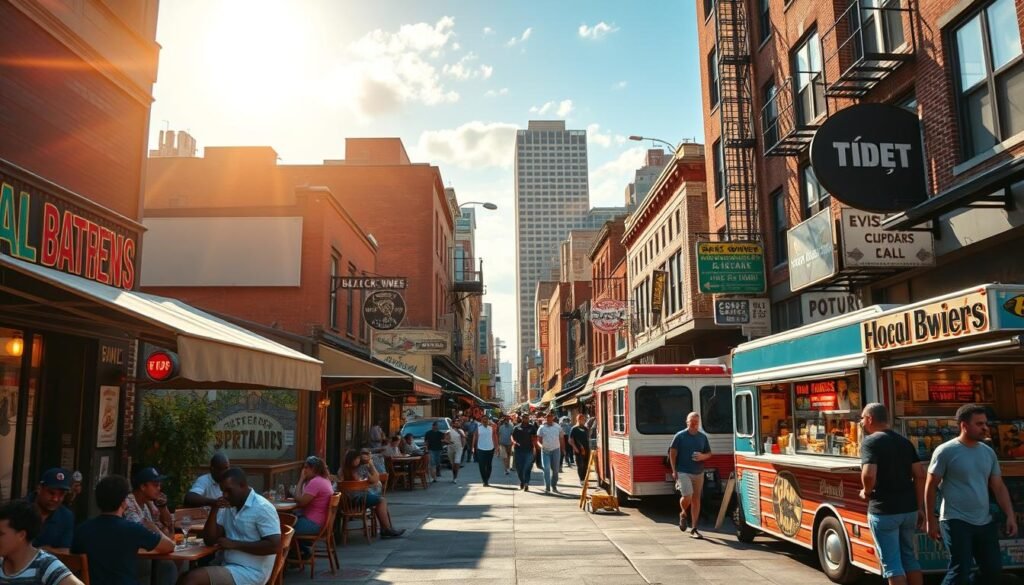
Cornbread Newark anchors the city’s soulful dining scene with hearty, Southern-inspired fare. Nearby, restaurants like Montclair Diner, Mesob Ethiopian, and Saveur Creole showcase the region’s culinary diversity—offering everything from American comfort food to East African dishes and Caribbean flavors.
For those seeking nightlife and live music, Papillon 25 and First Republic Lounge extend the experience beyond the dinner hour, blending cuisine with culture. Meanwhile, Lite & Soul Eatery, Roy’s Fish Fry, and HLS Juice Bar and Grill provide quick, flavorful meals that serve both locals and visitors on the go.
This curated list connects celebrated kitchens with everyday neighborhood staples, offering a practical guide to Black-owned restaurants in Newark and surrounding Essex County. Whether you’re planning a weekend food crawl or supporting local businesses during your visit to Newark’s Black Wall Street corridor, these spots deliver flavor, history, and hospitality.
🎭 Cultural Touchstones, Events, and Media Shaping Newark’s Black Wall Street Legacy
Newark’s Black business corridor is powered not only by commerce but by a vibrant creative economy. A dynamic mix of bookstores, films, and arena programs keeps the city’s cultural pulse visible to residents and visitors—connecting artists, scholars, and fans while boosting local Black-owned businesses.
Much like the cultural anchors found in Bronzeville, Chicago and Beale Street in Memphis, Newark’s creative platforms help shape public perception and preserve legacy.
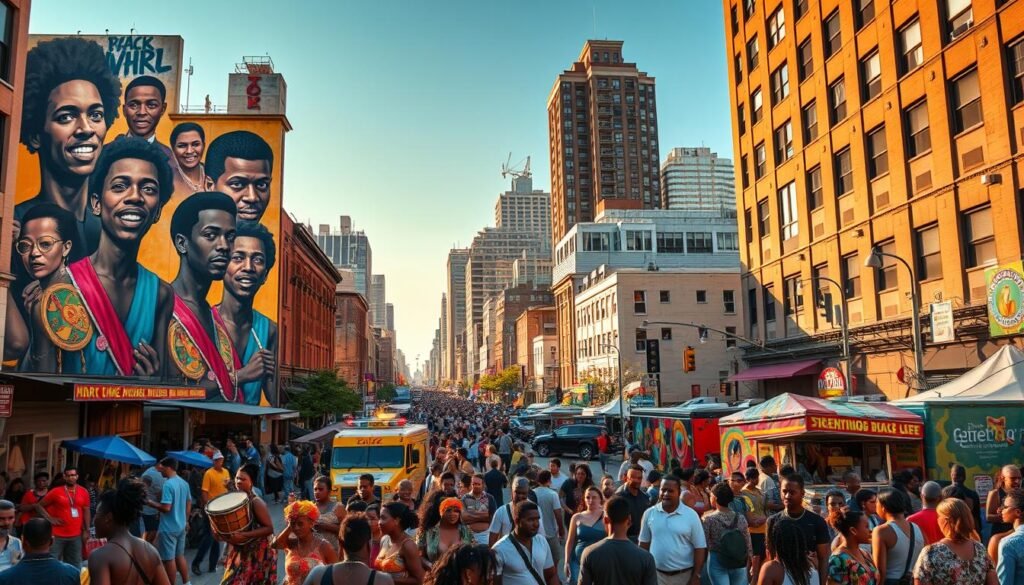
📚 Source of Knowledge Bookstore: Newark’s Oldest Independent African-Caribbean Bookshop
Located at 867 Broad Street, the Source of Knowledge Bookstore serves as a cultural marketplace and community hub. It offers a curated selection of books by and about people of African descent, alongside African art, drums, and Shona stones.
Beyond retail, the shop hosts yoga sessions, lectures, film nights, and space rentals—creating a space for learning, dialogue, and public gatherings. It stands as a modern-day cultural anchor within Newark’s Black Wall Street corridor, echoing the literary and civic traditions found in Durham’s Hayti District.
🏒 NJ Devils Black History Celebration at Prudential Center
The NJ Devils Black History Celebration transforms game nights into platforms for education, fundraising, and community recognition. Events like the February 21, 2023 matchup against Montreal featured exclusive content and activations that spotlighted Black history in New Jersey—bringing civic pride to a major arena audience.
🎬 “Why Is We Americans?” and Newark’s Creative Legacy on Screen
The documentary “Why Is We Americans?”, directed by Ayana Stafford-Morris and Udi Aloni, explores the legacy of the Baraka family and their impact on Newark’s arts and activism. The film frames local creativity as part of a broader civic and cultural movement—reinforcing Newark’s role in shaping national narratives.
🌟 Binge Newark’s Icons: Queen Latifah, Michael B. Jordan, and More
Newark’s influence on Black film and television is undeniable. A short watch list celebrates homegrown talent and filmmakers who’ve filmed in the city:
- Queen Latifah — Equalizer, Chicago, Hairspray
- Michael B. Jordan — Creed, Black Panther, Just Mercy
- Ernest R. Dickerson, Tobias Truvillion, Tisha Campbell-Martin, Shaquille O’Neal
Streaming these works highlights how local stories feed national attention, reinforcing Newark’s place in the Black cultural renaissance.
Together, these cultural touchstones—bookshop programs, arena events, documentaries, and star-driven media—shape Newark’s identity, draw audiences, and support nearby restaurants and businesses. Readers are encouraged to plan their cultural calendar around local premieres, public talks, and game nights to help sustain the city’s creative and economic momentum.
🗺️ Planning a Visit: Neighborhoods, Directories, and Community Resources
Exploring Newark’s Black Wall Street corridor is easier with curated tools that help visitors plan efficient, purpose-driven outings. Whether you’re seeking Black-owned restaurants, cultural landmarks, or local wellness spots, the city’s directories and filters make it simple to build a personalized itinerary.
📍 Newark Black-Owned Business Guide: Restaurants, Shops, Spas, and Arts Centers
The Newark Black Owned Business Guide aggregates verified listings across the city—from beloved eateries like Vonda’s Kitchen, The Yard, and Cornbread Newark, to nightlife venues like Papillon 25. Visitors can search by amenity, ownership, and service type to create a focused list that supports Newark’s Black business ecosystem.
This guide complements the broader Black Wall Streets Across America series, connecting Newark’s local economy to a national legacy of Black entrepreneurship.
🧭 Neighborhood Filters: Downtown, Ironbound, University Heights, and Beyond
To streamline planning, users can filter by neighborhood—including Downtown, Ironbound, University Heights, West Ward, North Ward, South Ward, East Ward, Central Ward, Branch Brook Park, and Weequahic.
Additional filters such as wheelchair accessibility, outdoor dining, curbside pickup, and online ordering help tailor searches to your trip goals—whether you’re organizing a walking tour, a family outing, or a solo food crawl.
📝 Submit Your Business Listing: Growing the Corridor Together
Local entrepreneurs can contribute to Newark’s Black business directory by using the Submit New Listing feature. Each submission is reviewed for accuracy before publication, ensuring the guide remains trustworthy and up-to-date.
This collaborative process strengthens Newark’s Black Wall Street revival, empowering residents, visitors, and business owners to grow the corridor together.
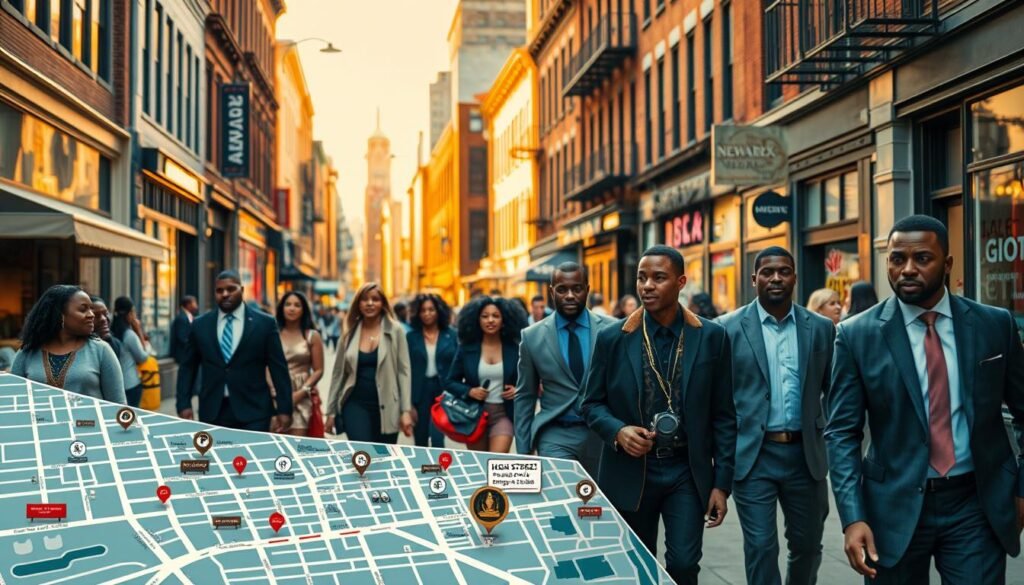
🏛️ Preservation, Memory, and the National Story of Black Wall Street Districts
Across the United States, preserving historic Black business districts protects more than buildings—it safeguards community memory, economic legacy, and civil rights history. From Greenwood Avenue in Tulsa to Jackson Ward in Richmond, these corridors were once thriving centers of Black entrepreneurship, organizing, and cultural life.
Short-term revitalization projects cannot replace the long memory embedded in these spaces. Sustained preservation efforts—spanning architecture, archives, and ongoing business continuity—link local action to a growing national movement to protect Black economic heritage.
This history reveals how urban renewal, freeway construction, desegregation, and gentrification disrupted Black commercial ecosystems. The loss of these districts fractured generational wealth and erased vital civic infrastructure.
To counter that, communities are embracing practical strategies such as:
- Documenting oral histories and community narratives
- Pursuing historic district designations through the National Register of Historic Places
- Creating small business financing tools tailored to legacy entrepreneurs
- Using community land trusts to secure long-term ownership and affordability
- Partnering with universities, nonprofits, and public agencies for technical assistance and funding
Organizations like the African American Cultural Heritage Action Fund are helping lead this charge, offering grants and guidance to protect sites of Black resilience and innovation.
Newark’s High Street joins this national story—standing alongside Sweet Auburn Avenue in Atlanta and Bronzeville in Chicago as a corridor where preservation fuels progress and memory powers momentum.
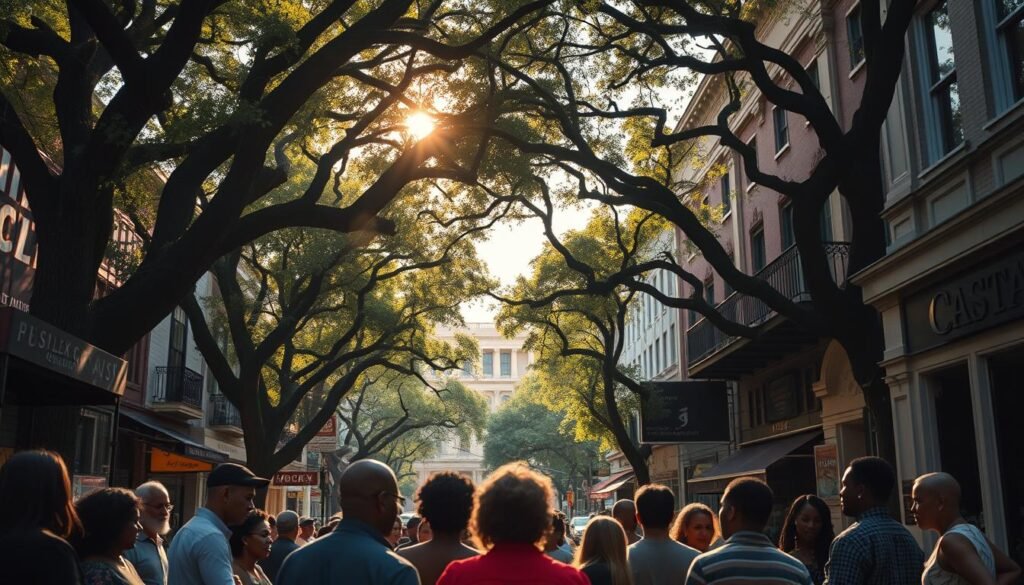
🧩 Preservation in Practice: Strategies That Sustain Black Wall Street Districts
The benefits of preserving Black business corridors are tangible: sustained cultural identity, increased heritage tourism, and expanded partnerships with archives, universities, and entrepreneurship platforms. Newark’s local models offer blueprints that other cities—from Durham’s Hayti District to San Francisco’s Fillmore District—can adapt to protect legacy commerce.
“Preservation is active stewardship: communities shape narratives and outcomes, not just commemorate the past.”
🛠️ Preservation Strategies and Their Impact
| Strategy | Primary Actor | Short-Term Result | Long-Term Impact |
| Oral History Projects | Universities / Libraries | Recorded memories, public exhibits | Stronger cultural archives |
| Historic District Designation | Local Government | Regulatory protection | Preserved streetscapes, tax incentives |
| Community Land Trusts | Nonprofits / Residents | Secured property | Long-term business ownership |
| Small Business Financing | Foundations / CDFIs | Access to capital | Business continuity, job creation |
These strategies align with national efforts led by groups like the African American Cultural Heritage Action Fund, which supports preservation through grants, technical assistance, and storytelling.
For a deeper dive into how preservation connects to policy, funding, and economic resilience, see this study on building Black-owned businesses. It outlines practical pathways for restoring legacy commerce and advancing equity.
🧭 Conclusion: Sustaining Newark’s Black Wall Street Corridor Through Culture, Commerce, and Community
Newark’s High Street corridor is more than a business district—it’s a living archive of Black history, civil rights, and community resilience. From cultural institutions like the Source of Knowledge Bookstore and the Institute of Jazz Studies, to digital platforms like Rise Up North and the Black Power map, Newark shows how culture and scholarship meet daily life.
Local restaurants such as Vonda’s Kitchen, Glaze Kitchen, and Cornbread Newark offer compelling reasons to visit, dine, and return—each one contributing to the city’s Black-owned business ecosystem. These establishments echo the legacy of Sweet Auburn Avenue in Atlanta and Paradise Valley in Detroit, where food, music, and memory fuel economic revival.
Residents and visitors can use this guide to plan meals, book events, and support businesses that link Black history, civil rights, and community pride across New Jersey.
Long-term growth depends on consistent patronage, smart policy, and creative collaboration. For insights into scaling impact, read this Brookings study on sustaining Black-owned businesses, which connects preservation work to practical funding models and economic equity.
Newark’s High Street is not just rising—it’s reclaiming its place in the national story of Black Wall Street districts. Let your visit be part of that legacy.
